I HAVE come to the conclusion that the only way to deal with the nervy business of driving in Greece, with poor roads and maverick drivers, is to treat it as a metaphor for life itself.
Focus on the scary, I’m-about-to-die moments as they come up and don’t obsess over the whole, long journey, or you’ll never set out.
Take it all one deep, crumbling pothole at a time.
I thought of this the other day when I had a long 50km drive from Koroni, at the tip of the Messinian peninsula to Kalamata, for a few early appointments. The road from picturesque Koroni is long and narrow, twisty in parts and used by tractors, pick-up trucks, buses, and all kinds of crazy drivers. It has poor edges in places, where the road sheers off on to deep drops, with no guard rails.
It also winds through two large villages with bottlenecks at intersections and is a nightmare on the laiki, market, days, and in summer, where the narrow roads are log-jammed with tour buses, camper vans, tractors and gypsy hawkers in pick-up trucks crammed with fruit and veg, the watermelons regularly bouncing off and splattering on the road.
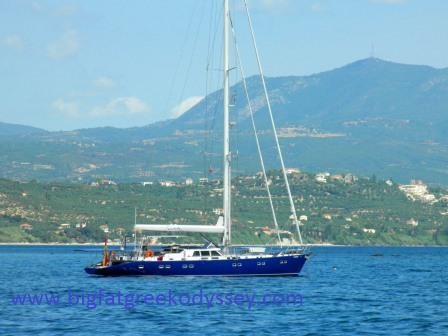
A typical sight from the road that winds along the coast from Koroni to Petalidi in the Messinian peninsula
Of course, it isn’t always hell. There are a few calm days, and if you can ever relax for a moment, the views along this road are gorgeous, looking across the Messinian gulf towards the Mani and the Taygetos mountains, with Kalamata city spread along the head of the Messinian gulf. There are moments when you glance at this beautiful region and remember why you’re in Greece to start with, but you can never take your eyes off the road for more than a second. Around every corner is the outrageously unexpected, and the close shave, of which we’ve had many.
This is what I saw on that one morning driving to Kalamata: drivers overtaking on blind bends and coming straight for you (very normal); pick-up trucks loaded with goats in the back (normal, though sometimes its donkeys and horses); one driver hogging a whole busy stretch of road while a police car desperately needed to overtake. The driver wouldn’t budge (Greek rebel, very normal). Luckily for him, he wasn’t later pulled over by the cops. I’ve seen similar with ambulances trying to overtake on life-saving missions.
That morning I also saw a motorbike rider with no helmet (very normal) weaving about and awkwardly carrying a large wrapped package under one arm; a couple on another motorbike with two children sandwiched on the seat between them (no helmets) and at least one farmer walking along the road trailing four skittery goats on ropes. There are animal hazards aplenty on Greek roads, including runaway chickens, and once I had to dodge a horse cantering down the road with no rider or escort.
For British drivers, the roads here can be terrifying. I know expats who refuse to drive, or will only drive around their own village. I sympathise with their anxieties, especially in the Mani, where the roads through the Taygetos mountains are full of hairpin bends and sheer drops.
So when I set off on a long journey alone, I psyche myself up and say, “I’ll just take it one hazard at a time”. If you think of the whole journey, you’re doomed. It’s all you can do.
It’s also while driving that the mystifying nature of Greeks always occurs to me. I mean no offence, of course, to the Greeks because as a race I think they are wonderful, generous, unique, and I love them. But why oh why do they go bonkers on the road, breaking every rule in the book, playing with the equivalent of a loaded gun? Ordinarily, I love the maverick, non-conformist attitude of Greeks. I love the way they can think for themselves and not rely on the nannying attitude we suffer in Britain, for example, but behind the wheel of a car, this attitude goes to a lethal extreme.
Sometimes it is comical, too, like the guy I once saw in Kalamata, driving with his knees while he rolled up a cigarette. A guy on a motorbike with a trombone in his lap. A motorbike rider on a busy city street ferrying a tray in one hand with frappes on top. A motorbike pulling a small, two-wheel trailer, in which a man sat – holding a ladder. And the parking is also crazy: cars parked at the head of one-way streets, across corners, on pavements. Sometimes you laugh at all this eccentric behaviour. But other times you live in fear.
If you were expecting any advice about driving in Greece, I haven’t got any, other than the one I stick resolutely to. Give way to everything, always, even when you have the right of way. And get a good insurance broker because if, God forbid, you do have an accident, sorting it out in Greece can be complicated, with so many drivers uninsured, driving old wrecks with no MOT, bald tyres and dodgy brakes.
Our Kalamatan broker Panayiotis is a star, who will let you speed-dial his number any time, if you have any incident on the road.
When we first came to live in the Mani in 2010 we went to see him to get comprehensive insurance for our Greek car. Initially there was a setback, which was typically Greek and amusing. I included the anecdote in my book Things Can Only Get Feta and I quote it here:
“We had to wait about 10 days for the paperwork to arrive, during which time we only had third-party cover, and drove the car around as if it were a Ming vase on wheels.
“When we returned to pick up the paperwork, the broker told us there was a hitch. We had been knocked back by the preferred insurance company and another would have to be arranged. When we asked why we had been rejected he told us the first company was no longer insuring foreign drivers in Greece as they were a high risk.
“Do you mean they think we are poor drivers?” I asked.
“No. The company says foreigners don’t know how Greeks drive,” he told us. When we burst out laughing, he offered a wry smile. By then we knew exactly how Greeks drive – at high speed, on the wrong side of the road, while rolling up cigarettes, eating souvlaki, slurping coffee, talking loudly on the mobile. Doing anything, in fact, but driving.”
On the way home that particular day at the quiet siesta time, the nicest time to drive, I had to smile when I saw the nonchalant farmer again leading his goats along the road, going home this time. Happily, we had all survived another day on Greek roads.
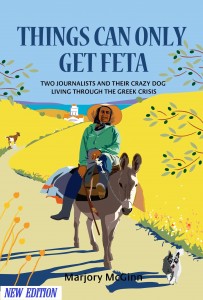 Book news – Things Can Only Get Feta
Book news – Things Can Only Get Feta
AFTER being out of print for several months, the paperback edition of Things Can Only Get Feta: Two journalists and their crazy dog living through the Greek crisis has been republished and is now available on Amazon sites:
It is also available on Kindle as well.
The book explores our first year of living in the Mani, in southern Greece, with our dog Wallace, trying to live as authentic a life as possible with sad and funny consequences. The sequel to this book, covering our last two years in the Mani, will be available in the summer.
For more information on Things Can Only Get Feta, visit the book page on this site www.bigfatgreekodyssey.com
Thanks for stopping by.
© All rights reserved. Text and photographs copyright of the authors 2015. No content/text or photographs may be copied from the blog without the prior written permission of the authors. This applies to all posts on the blog.
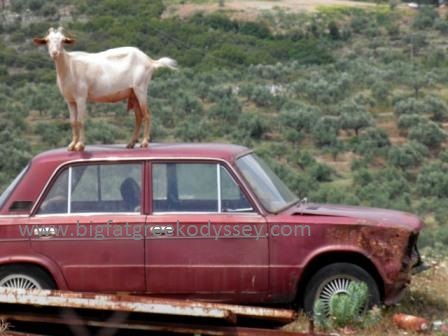
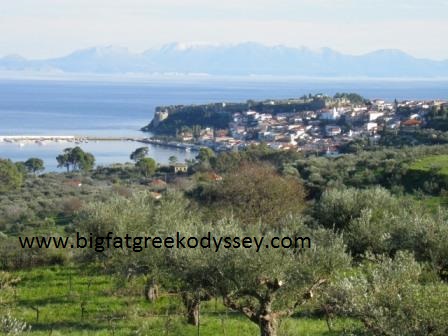
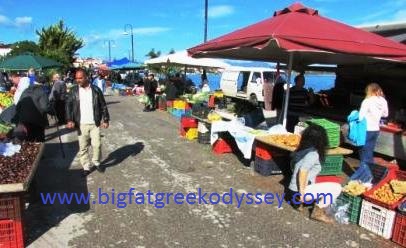
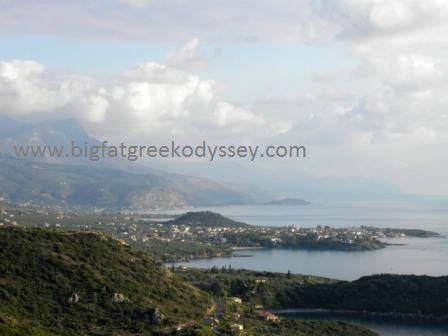
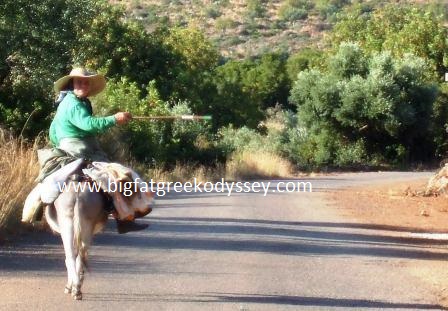
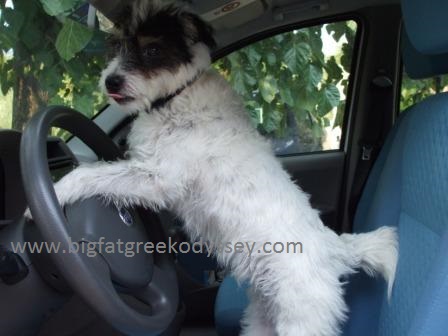
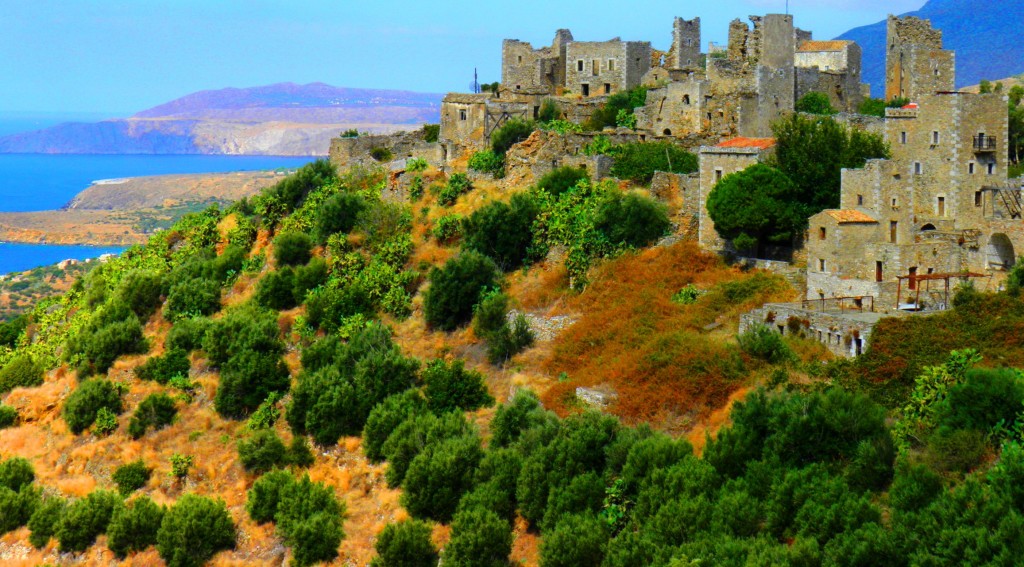
Your blog is always a pleasure to read
Thank you Chris. Very kind of you to say.
Regards,
Marjory
Haha, I fully sympathise with foreigners driving in Greece or even being driven around. Everything you mention I have seen, there’s craziness in the cities and rural areas with the latter being infinitely crazier because of the livestock involved in the sightings. Horses can run away and even in my little town I found myself following one down the highway for a long while one day, the traffic backing up behind it. So surreal, haha 🙂 Great post, Marjory!
Know exactly what you mean Marjory. We hire a car every time we go to Stoupa so we can see different places. The husband does all the driving and what a nightmare it can be. We have had a couple of close encounters. Always glad to get the car parked up again in Stoupa for the night and head on down to the front for a refreshing couple of large Mythos. Happy days.
Hi Lynn,
I know what you mean. It’s a challenge driving here, especially in the Mani with all those hairpin bends. You can never relax, but the scenery makes up for it most of the time, and the Mythos by the seafront, of course.
Kind regards,
Marjory
Hi Marjory, congrats on the books have the first two very enjoyable. I was so pleased to read that you met up with Foteini again, I think she really missed you!
Been to Kos (’79) Rhodes (’93) and recently Corfu (Apr ’16) for two weeks. Getting on a bit and cannot take the cold damp and dark winters in Ireland (Cork). The 2 wks in April, I was so happy, hope to rtn in Oct, stayed opposite Mon Repro in the Arion Hotel. I am looking to stay in Corfu over the winter as the winter is at least 2 mths shorter than here and the sun sets later. I have never blogged before hope my blog etiquette is correct. All the best Paul
Hi Paul,
Thanks very much for your comment. I’m glad you liked the first two books. Many people enjoy reading about Foteini as much as I enjoy our crazy friendship. There’s a third book now, A Scorpion In The Lemon Tree and Foteini makes a couple of very notable appearances especially on a shopping trip to Kalamata. Yes, you should try Corfu for the winter, although it can rain a lot there and is quite cold in winter as it’s fairly northern. You would be better in southern Greece. It is warmer. We used to swim up to Christmas and then again in February or March. The Mani or Koroni in the opposite peninsula is lovely.
Do let me know how you get on, or if you want more info.
Kind regards,
Marjory
Hi Marjory,
Thanks for your reply. Yes you are right about the location, however I have made contacts on Corfu during my visit. Your new book mentions Kononi, I got a shock!! Because I am looking at renting initially in Kanoni, on the Kanoni Peninsula south of Corfu town, and I thought you had moved to Corfu. I am on my 17th book about Corfu, Tilos and the Mani your book will be 18th. I am also trying to learn Greek used what I knew to great effect in April and the locals were so appreciative that I tried to speak their language. Hope to go back in Oct, picked Oct & Apr to try and get a feel of what it would be like over the winter. Thanks again for your reply and I will let you know how I progress. Kind regards Paul.
Hi Paul,
My new book, A Scorpion In The Lemon Tree is set in Koroni, on the Messinian peninsula which is next to Mani peninsula, but not Kononi, which is in Corfu. Sorry if that disappoints you. Koroni is a lovely place, and as I said, it’s much warmer in winter. Check it out some time. And keep up your Greek.
Kind regards,
Marjory